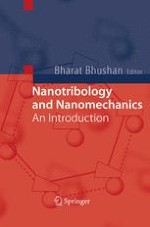2005 | OriginalPaper | Chapter
Micro/Nanotribology of MEMS/NEMS Materials and Devices
Author : Bharat Bhushan
Published in: Nanotribology and Nanomechanics
Publisher: Springer Berlin Heidelberg
Activate our intelligent search to find suitable subject content or patents.
Select sections of text to find matching patents with Artificial Intelligence. powered by
Select sections of text to find additional relevant content using AI-assisted search. powered by
The field of microelectromechanical systemsMEMS/NEMS nanoelectromechanical systemshas expanded considerably over the last decade. The length scale and large surfaceto-volume ratio of the devices result in very high retarding forces such as adhesion and friction that seriously undermine the performance and reliability of the devices. These tribological phenomena need to be studied and understood at the micro- to nanoscales. In addition, materials for MEMS/NEMS must exhibit good microscale tribological properties. There is a need to develop lubricants and identify lubrication methods that are suitable for MEMS/NEMS. Using AFM-based techniques, researchers have conducted micro/nanotribological studies of materials and lubricants for use in MEMS/NEMS. In addition, component level testing has also been carried out to aid in better understanding the observed tribological phenomena in MEMS/NEMS.
Macroscale and microscale tribological studies of silicon and polysilicon films have been performed. The effects of doping and oxide films and environment on the tribological properties of these popular MEMS/NEMS materials have also been studied. SiC film is found to be a good tribological material for use in high-temperature MEMS/NEMS devices. Hexadecane thiol self-assembled monolayers and bonded perfluoropolyether lubricants appear to be well suited for lubrication of microdevices under a range of environmental conditions. DLC coatings can also be used for low friction and wear. Surface roughness measurements of micromachined polysilicon surfaces have been made using an AFM. The roughness distribution on surfaces is strongly dependent on the fabrication process. Roughness should be optimized for low adhesion, friction, and wear. Adhesion and friction of microstructures can be measured using novel apparatuses. Adhesion and friction measurements on silicon-on-silicon confirm AFM measurements that hexadecane thiol and bonded perfluoropolyether films exhibit superior adhesion and friction properties. Static friction force measurements of micromotors have been performed using an AFM. The forces are found to vary considerably with humidity. A bonded layer of perfluoropolyether lubricant is found to satisfactorily reduce the friction forces in the micromotor.
AFM/FFM-based techniques can be satisfactorily used to study and evaluate micro/nanoscale tribological phenomena related to MEMS/NEMS devices. This chapter presents a review of macro- and micro/nanoscale tribological studies of materials and lubrication studies for MEMS/NEMS and component-level studies of stiction phenomena in MEMS/NEMS devices.
